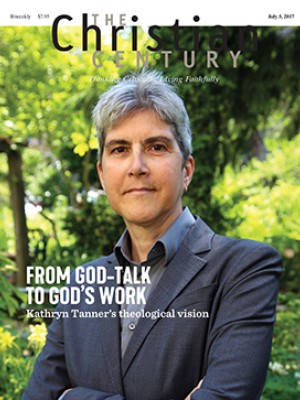Us, them, and the pronouns we use
Small words can say a lot about how we see our place in the world.

On a scorching summer Sunday in 1982, I stood in the pulpit of an all-black congregation on Chicago’s South Side. Ushers had opened the louvered windows as wide as they would tilt. The church was packed. I wasn’t there to preach. The pastor had allotted me five minutes to thank the congregation for its support of my 18-month construction stint at a mission outpost in Cameroon. I spoke enthusiastically of what my work crews and I were able to accomplish.
After worship, a woman who looked as if she might be the church matriarch leaned in close to say, “Bless you, Peter. I hope you’ll take a suggestion kindly. Please don’t use the phrase ‘my workers’ when speaking of the African men who worked with you—especially when you’re in the company of little black boys and girls who need a different future than the subservient one handed to their ancestors.” I thanked her for her words. Not everyone could say to a guest what she said to me. Like a few other hard lessons in life, this one has stayed with me permanently.
Read our latest issue or browse back issues.
How we use pronouns reveals more than we may realize about our alignment with different social identity patterns. Like a play on an old joke that begins—“There are two kinds of people in the world . . .”—we often unwittingly group people into categories of us and them. Even when we intend no particular disparagement or diminishment of the other, our pronouns may communicate otherwise.
In the early church, pronouns created similar tension. The great debate surrounding the inclusion—or not—of gentiles into the larger fellowship of Jewish Christians swirled with such controversy. The stakes were high when the first major church convention took place in Jerusalem (Acts 15). A Jewish contingent argued that nothing less than circumcision and full adherence to Mosaic Law would allow for the welcome of gentile outsiders. Paul and Barnabas challenged that ungenerous and conditional welcome, insisting that non-Jews were children of God with no strings attached. Baptism and a proclamation of Jesus as Lord were all that was needed.
The decisive moment came when Peter stood up to speak of the gentiles. “God, who knows the human heart, testified to them by giving them the Holy Spirit, just as God did to us; and in cleansing their hearts by faith God has made no distinction between them and us.” This would be the last time in the witness of the early church that gentiles and Jews would be referred to as them and us.
If Christians, in their best moments, can remember that there is more than one way of being authentically Christian, perhaps we Americans can assume a similarly generous mind-set when contemplating our national identity alongside other nations (see editorial "When America doesn't lead"). When we celebrate patriotism over nationalism, and hold an affection for the deepest values of our country as it engages with other countries, perhaps we can avoid the nationalistic sense of superiority that resents other nations, views all criticism as insult, and feeds the worst impulses of an us versus them narrative.
Keep listening for voices that are as honest as that of the church matriarch who schooled me in my use of my—fresh voices unafraid to speak of the danger in pitting us (America) against them (the rest of the world).
A version of this article appears in the July 5 print edition under the title “Pronoun tensions.”







